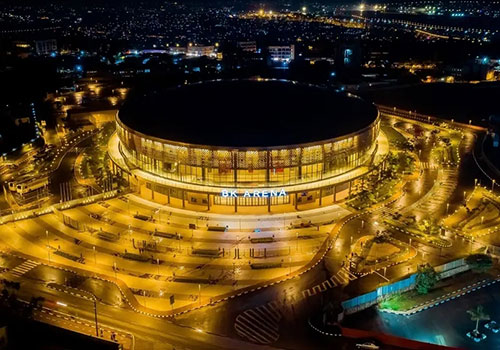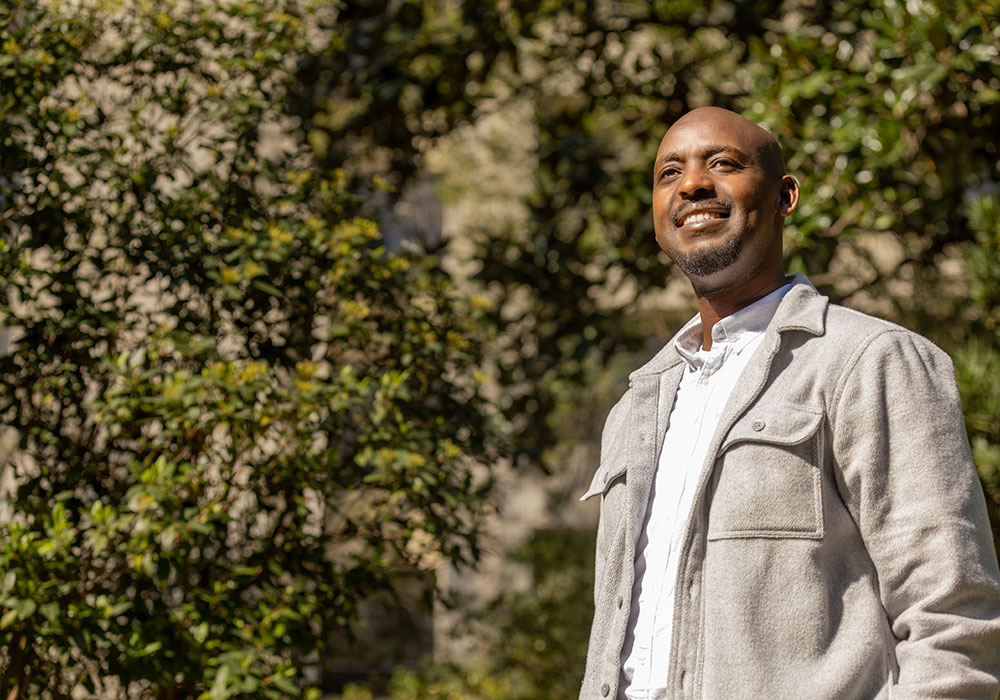Aaron Gaga was born in 1987 as an unwelcome refugee in Uganda, his parents having fled his native Rwanda because of conflict.
Unfortunately, things only got worse for his country. During a 100-day period between April and July of 1994, armed Hutu militias under the authority of Rwanda’s government targeted the Tutsi minority ethnic group in a genocide that left more than 800,000 people dead and another 2 million displaced. Gaga was 7 years old.
Today, though, both Rwanda and Gaga have emerged triumphant — determined not to forget the past, but also not to dwell in it, focusing instead on making their nation and their world a better place.
Gaga is a graduate student in the University of South Carolina’s highly ranked Master of Sport and Entertainment Management program. Coming to Columbia to pursue his master’s degree means being separated from his wife, daughter and infant son. It is the kind of decision he and many of his fellow Rwandans make for the greater good.
“I’m learning a lot, and what I’m learning I must then take back home,” says Gaga,
whose family returned to Rwanda one month after the genocide against the Tutsi ended on July 4, 1994. “We are not relaxing. We know where we’re
coming from, we know where we are, and we know where we’re heading. There is a lot
of sacrifice [from] different people, and these people are willing to give their best
in order to improve the country.”

As the 30th anniversary of the Rwandan genocide approaches, the country has a new government, a new constitution, and high hopes for continued recovery. The progress has been remarkable. After almost ceasing to exist as a nation in 1994, Rwanda has a steadily growing economy. Its tourism industry and sport and entertainment industry are also thriving. BK Arena in Kigali has hosted Basketball Africa League games since 2019. The BAL is a partnership between the International Basketball Federation and the NBA.
Gaga was a deputy venue manager at BK Arena, and its managing company sent him on his first visit to the U.S. in 2022.
“We had started already seeing sports entertainment as a business in Rwanda, but not in a very systematic way,” he says. “So, what I'm here to do is to see how that ecosystem works in the United States and then take that framework and go customize it and make it suitable to our market,” he says.
USC’s reputation and ranking as one of the world’s best sport and entertainment management programs led him to Columbia, and it has not disappointed. Among other things, he has had the opportunity to be part of the department’s “From the Desk of the President” class, led by faculty members and industry leaders Danny Morrison, Susan O’Malley and Bill Sutton. The class has included an all-star lineup of executives. Gaga himself was in charge of leading a discussion with Oak View Group CEO Tim Leiweke.
“I've learned a lot from industry leaders who are really driving the changes, driving the industry in the United States. It’s a golden chance,” Gaga says. He has also found a warm welcome from faculty and fellow students alike who helped him get settled and introduced him to life in the U.S.
The future is bright for Gaga and his country, but they will still pause on April 7 as they do every year to remember the past. The commemoration known as Kwibuka is a week of mourning for those lost in 1994. Gaga and other Rwandans abroad will observe the 30th Kwibuka from wherever they are.
Gaga and his fellow Rwandans remember the past — the brutality of the attackers, the indifference of the world to Rwanda’s suffering — but they are focused on the future.
“Yes, people had a hand in it. Strong and powerful countries had a chance, and they didn’t do anything,” Gaga says. “But we cannot sit here and say now, ‘This one did this, this one, this, this one.’ So, let's own it. This is our situation. Let's own it and make it happen. A lot has been done to have a new generation coming up in Rwanda, ready and willing to take the country forward."
